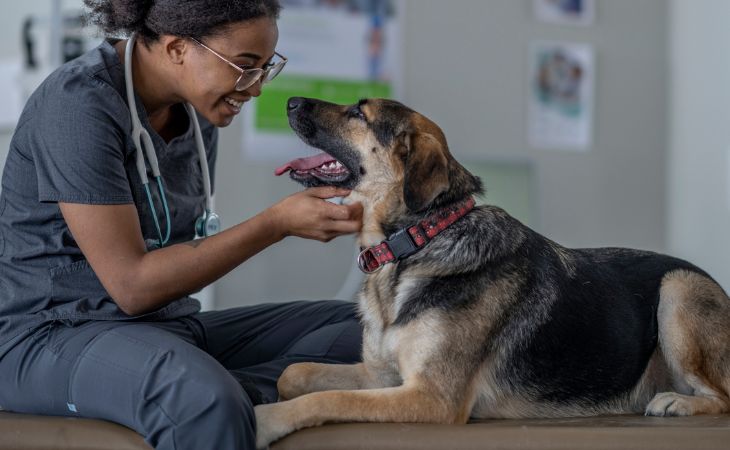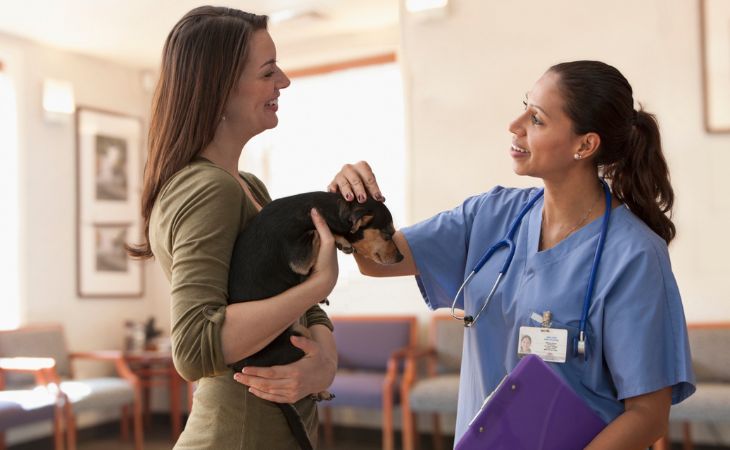To ensure your dog’s well-being, it’s important visit the vet regularly. There are always important questions that you could ask during these visits. Whether you are a new pet parent or have several years of experience, it’s normal to ask about different key aspects of your dog’s health. Letsgetpet is presenting 10 questions to ask your vet to better understand your dog’s health and well-being.
Is my dog at their ideal weight?
This is one of the most important questions to ask your vet. No matter your dog’s age, you should ask about their weight. When dogs eat a lot and aren’t very active, they can gain weight quickly and even become obese.
The ideal weight of a dog depends of several factors, such as their breed, age, and the amount of exercise they get. The vet can help you evaluate their ideal weight and give you personalized tips to maintain it. You can also keep an eye on your dog’s weight by weighing them regularly. Even though some owners do this during annual visits to the vet for vaccines, you can weigh your dog every month for a more rigorous check. This should notably be done for senior dogs. By doing this, you can prevent obesity issues or weight loss.
How do I feed my dog correctly?
Food is the main factor that influences the health and general well-being of dogs. Kibble is popular dog food because it is nutritious and easy to digest. In addition, many people prioritize bi-nutrition, adding wet food to this diet. These are common choices. Dry and wet food are formulated to respond to nutritional needs of dogs and are easy to stock and use. Ensure you choose products that are high-quality.
Preparing food for your dog at home can also be a good option. However, you should consult a vet first to ensure that their meals are balanced and respond to all the nutritional needs of your dog.
Does my dog get enough exercise?
Dogs need to stay active to maintain their good health. A lack of exercise leads to weight gain, and can be a source of many other problems in the future. The needs of your dog when it comes to exercise varies depending on many factors (age, breed, their state of health). In general, small breeds need around 30 minutes of exercise a day, while larger breeds need around 60 to 90 minutes. A lack of exercise can be noticed in several ways:
- destructive behavior,
- overexcitement at the idea of going out,
- agitation with no apparent reason,
- pronounced, exaggerated barking,
- depression and other behavior issues.
Thanks to this information, your vet can tell you if your dog is not exercising enough. They can then advise you to go on more regular walks, use interactive toys, or take on activities that are more specific depending on the breed.
This Letsgetpet article might interest you: How often and for how long should I walk my dog?

What are the necessary vaccines?
In general, vaccines provide animals protection against diseases. Your vet can recommend vaccines to protect your animal by considering their environment and lifestyle. They can also indicate to you the mandatory treatment you would need to go on a trip, for example.
Does my dog need a blood test?
Blood tests are often done when a dog is ill. Vets use this information to carry out more detailed examinations to establish a diagnosis. When your dog reaches the age of 8, they should have a regular check-up (every year).
An annual blood test allows them to identify infections, the inflammations, kidney or liver disease, hormonal disorders, and many other pathologies. It’s a way of quickly detecting any problem before it gets worse. Even if the frequency recommended is a year, it comes to the vet to decide depending the state of the animal.
Are my dog’s teeth and gums healthy?
Just like for humans, a dog’s oral health has a direct impact on their general health. For example, the presence of tartar can provoke an inflammation of the gums and loosening of the teeth. As well as causing oral disease, it can also lead to heart and kidney problems, as bacteria migrate through the bloodstream.
Even if there are no obvious signs , you can always ask your vet questions to determine whether or not your dog’s teeth and gums are health. This will lead them to do examinations and detect eventual problems (dental plaque or tartar, for example) and treat them in time.
Which anti-parasite treatment should I use for my dog?
Every pet parent needs to decide the type of anti-parasite treatment they wish to use for their dog. However, this decision should also be made in collaboration with a vet. Do not hesitate to ask your vet questions about this. There are multiple types of anti-parasite products:
- pipettes,
- collars,
- sprays and shampoos,
- tablets.
When choosing, learn about the duration of each type of protection. When making recommendations, vets take into account your pet’s environment, lifestyle, sensitivities, and their closeness with you (and your children). Do not hesitate to express personal requirements for an optimal choice.
How do I give medication to my pet?
This is one of the most important questions to ask your vet, notably if your pet needs to follow a treatment at home. Dogs can be very difficult when it comes to taking medication. However, with the right techniques, you can give them medication without too much stress.
The form of the medication counts a lot. It is, for example, easy to give medication in the form of a liquid by using a syringe without a needle. When it comes to tablets, some owners hide them in treats. If your dog doesn’t fall into this trap, you will perhaps need to hold their jaw and place the medication at the back of the tongue. Then, close their mouth and gently massage their neck to help them swallow it. Vets can also give other advice in having taken the time to study the behavior of dogs with medication.
Can I get a quote for my dog’s care?
In general, vets present at the clinic, an indicative list of the prices for the most common types of visits, like consultations, vaccinations, and some basic treatments. You can ask your vet for a quote for the next appointments, operations, or other types of procedures.
Quotes are important for all pet owners, because vet care for a pet can sometimes be expensive. Knowing an estimation of the amount you’ll need to be spend in advance will allow you to be prepared. Before the next consultation, ask the vet for an evaluations of the costs for care and planned procedures. For prolonged treatments or complex care, ask for a detailed quote that includes all of the planned procedures, as well as the eventual supplemental costs. You will avoid getting surprised by costly vet care.
When do we need to come back for another appointment?
Pet parents can sometimes forget to ask questions like this. You need to know the date of the next appointment with this professional, and define, if necessary, a reminder. In the context of treatment, for example, missing your dog’s appointment with the vet can have undesirable consequences.
In the absence of a particular health problem, know that an adult dog should see a professional at least once a year. This visit is done for a general health check-up, including vaccine reminders and a complete physical examination. Puppies and young dogs need to have more frequent vet visits, often every month during the first few months of their life.

